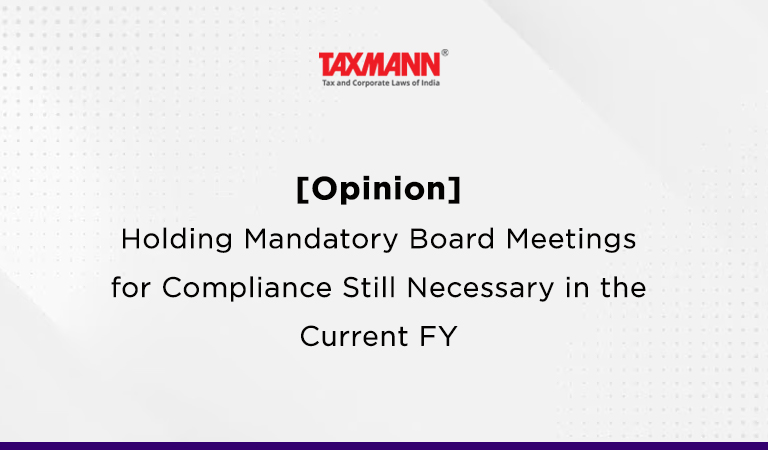[Opinion] Holding Mandatory Board Meetings for Compliance Still Necessary in the Current FY
- Blog|News|Company Law|
- 2 Min Read
- By Taxmann
- |
- Last Updated on 24 April, 2023

Prof R Balakrishnan – [2023] 149 taxmann.com 331 (Article)
1. The Preamble to the article
The issue in this case revolves around the calendar year v/s the financial year. Hence, we shall try to examine at the first place, the term “year” refers to the calendar year or financial year in the first place. The term “year” is not defined in the Companies Act 2013 and therefore the definition needs to be referred to under the General Clauses Act, 1897 in this respect.
The Companies Act 2013 relating to meetings of the board states that every company shall hold the first meeting of the board of directors within thirty days of the date of incorporation and thereafter hold a minimum number of four meetings of its board of directors every year in such a manner that not more than one hundred and twenty days shall intervene between two consecutive meetings of the board. (Section 173(1) of the Companies Act 2013).
Here, one could note that the Act talks about a year and does not say specifically calendar year or financial year. It may also be noted that the stipulation in the Companies Act 2013 in case of a one-person company, small company or Dormant and private company, if such private company is a start-up company, it shall hold at least one meeting of the board in each half of a calendar year also clarifies the intention of lawmakers to mean calendar year and not the financial year. (Section 173 (5) of the Companies Act 2013).
In view of the above, the calendar year has been prescribed in the secretarial standard -1 relating to meetings of the board of directors for reckoning a minimum number of meetings to be conducted by the companies as per the provisions of the Companies Act 2013.
At this stage, we could conclude by saying that the board meetings provisions relating to the minimum number of meetings to be conducted are required to be reckoned with reference to the calendar year and not with reference to the financial year.
2. Brief about this case
M/s ETSYSTORE Private Limited had conducted the mandated minimum of four meetings in a financial year within the maximum interval not exceeding one hundred and twenty days between any two consecutive meetings as prescribed in the Act and they were under the impression that they had adhered the requirements of the provisions of the Companies Act and they were fully compliant.
However, when the meetings were reckoned with reference to the calendar year – the company had committed default with respect to one of the board meetings and the regulator had initiated penal proceedings and the company and its directors were penalized for this non-compliance to a tune of rupees 1.64 lakhs.
Click Here To Read The Full Article
Disclaimer: The content/information published on the website is only for general information of the user and shall not be construed as legal advice. While the Taxmann has exercised reasonable efforts to ensure the veracity of information/content published, Taxmann shall be under no liability in any manner whatsoever for incorrect information, if any.

Taxmann Publications has a dedicated in-house Research & Editorial Team. This team consists of a team of Chartered Accountants, Company Secretaries, and Lawyers. This team works under the guidance and supervision of editor-in-chief Mr Rakesh Bhargava.
The Research and Editorial Team is responsible for developing reliable and accurate content for the readers. The team follows the six-sigma approach to achieve the benchmark of zero error in its publications and research platforms. The team ensures that the following publication guidelines are thoroughly followed while developing the content:
- The statutory material is obtained only from the authorized and reliable sources
- All the latest developments in the judicial and legislative fields are covered
- Prepare the analytical write-ups on current, controversial, and important issues to help the readers to understand the concept and its implications
- Every content published by Taxmann is complete, accurate and lucid
- All evidence-based statements are supported with proper reference to Section, Circular No., Notification No. or citations
- The golden rules of grammar, style and consistency are thoroughly followed
- Font and size that’s easy to read and remain consistent across all imprint and digital publications are applied



 CA | CS | CMA
CA | CS | CMA
